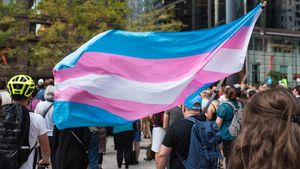Amid the roses
and balloons, and the tears and cheers of joy, gay men and
lesbian couples married in Connecticut last Wednesday -- the
first day that same-sex marriages became legal there.
Barbara
Levine-Ritterman of New Haven, Conn., and her partner of
more than 16 years, Robin, were one of the eight
couples who sued the state in 2004 after they were
refused marriage licenses.
And so it was
especially fitting that they were the first same-sex couple
to obtain a marriage license Wednesday morning from New
Haven City Hall -- only minutes after superior court
judge Jonathan Silbert entered final judgment on the
case just a few blocks away across town.
"It made
me proud," Levine-Ritterman said, adding that when
she and Robin filed for a civil union three years ago,
they were required to stand in a separate line from
those who were seeking marriage licenses.
But she said it
"felt very different" on Wednesday when the
two women stood in the same line as every other couple
-- straight or same-gendered.
"I'm proud that Connecticut is my
home," Levine-Ritterman said.
Connecticut
became the third state in the nation to legalize marriage
equality on October 10 -- joining California and
Massachusetts -- after its supreme court ruled that
denying gay couples the right to marry violated the
state's constitution.
Earlier this
month voters in California passed Proposition 8,
amending the state's constitution to prohibit
same-sex marriage. The state's supreme court
had ruled in May that denying gay and lesbian couples
the right to marry violated the constitution.
Previously,
Connecticut only afforded same-sex couples the recognition
of civil unions.
But in
Kerrigan and Mock et al. v. Connecticut Dept.
of Public Health (the department that supervises
marriage licensing in Connecticut), Gay and Lesbian
Advocates and Defenders, in conjunction with a team of
Connecticut-based attorneys, argued that the
state's 2005 civil union law failed to provide
same-sex couples with the equal protection guaranteed
under Connecticut's constitution.
Ben Klein, the
senior GLAD lawyer who argued the marriage case before the
court, said usually when final judgment is entered on a
decision, it is done with little fanfare and
generally handled by the court's clerks.
But on Wednesday
morning, he said, Judge Silbert chose to read aloud and
then sign the ruling during an open court hearing -- an
event that was attended by all eight plaintiff
couples; Connecticut's attorney general,
Richard Blumenthal; and numerous gay marriage
supporters and members of the press.
"I think
that the judge wanted to acknowledge the historic nature of
the day," said Anne Stanback, executive
director of the Hartford-based Love Makes a Family,
adding that immediately after the signing Blumenthal then
sent a "blast fax to every town in the state"
to say that marriage was now legal for same-sex
couples.
Stanback -- whose
group, working closely with the GLAD attorneys, led the
grassroots lobbying effort for equal marriage rights in
Connecticut -- said that though it was impossible to
know the actual number of Connecticut same-sex couples
who have already obtained marriage licenses and/or
were married this week, she expects hundreds of couples to
do so over the next couple of months.
"And I
think thousands more as we move into next year," she
said.
Since the
Connecticut decision cannot be appealed to a federal court
-- the case and the ruling were based on state law --
gay marriage opponents there had pinned their hopes on
changing the state's constitution.
On last
week's ballot, Connecticut residents voted on whether
the legislature should convene to review the
state's constitution. The state constitution
requires the question to be posed on the ballot every 20
years.
The Family
Institute of Connecticut and the Connecticut Catholic
Conference urged residents to vote in favor of a convention,
citing the need to outlaw marriage equality through
referendum. But the there has been little, if any,
backlash to last month's ruling, and Connecticut
residents voted against holding a new convention.
"The real
story" about gay marriage in Connecticut is
"that it's really a non-story
here," Stanback said.
Klein agreed.
"It's a state in which most people are very
accepting and even-keel about change," Klein
said. "Connecticut is a very tolerant
state."
And unlike
California and other states that passed similar antigay
marriage measures last week, in Connecticut constitutional
amendments can only be initiated by the state
legislature. And Klein said that there does not appear
to be any significant support within Hartford's
Democratic-controlled general assembly to do that.
"It really
is clear sailing here on out for equal marriage in
Connecticut," he said.
Still, the gay
marriage victory for Connecticut's LGB community was
a bittersweet one, with the passing of
California's Prop. 8 last week still fresh in
the minds of many.
"It's heartbreaking," Klein said of
Prop. 8.
But he added that
the success in Connecticut is proof that the marriage
equality movement continues to move forward and make
progress.
"The equal
marriage movement is still alive and well," Klein
said.












































































